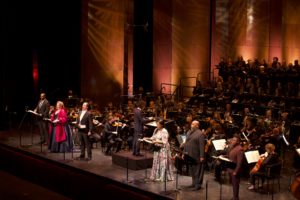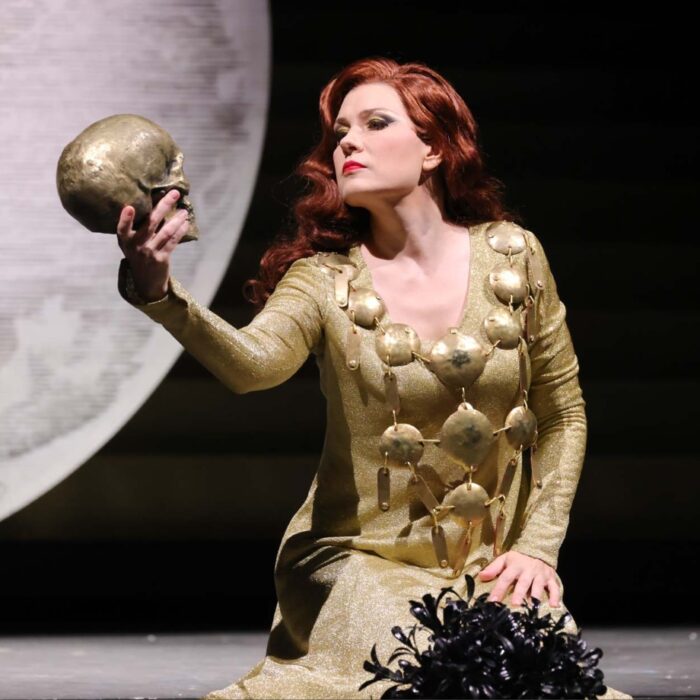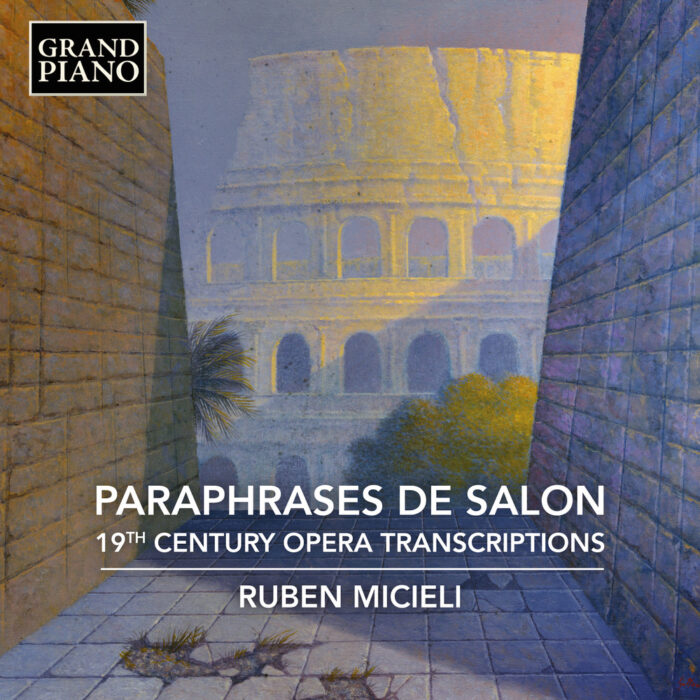
Detroit Opera 2021-2022 Review: Aida in Concert
By John VandevertOn December 30th, Detroit Opera ended its transformative 2021-2022 season with a concert production of Giuseppe Verdi’s opera “Aida,” his antepenultimate work whose Oriental plot and exotic aesthetics discredit the work’s premiere location, ironically the Khedivial Opera House in Cairo, Egypt. It seemed people of all kinds came to see this production, one of opera’s most infamous players.
It should be noted that Verdi hadn’t initially wanted to write the opera and only did so after being convinced by the eminent Egyptologist Auguste Mariette’s proposition of a festive opera to French theatre manager Camille du Locle. By a stroke of luck, Verdi agreed (only after a pretty penny fee of $160,000). Despite the opera’s many issues, the opera’s creation fell during a time of great for the composer. The social conflagration that was his infamous “Requiem” (1874), chastised for its inappropriate grander given its religious subject, coupled with the death of close friendships (basically father/son) with Angelo Mariani and Arrigo Boito, the lukewarm reception of his artistic pride and joy “Don Carlos” (1867/84) on top of the endemic difficulties composing, and basically the world was out to get him on nearly every front.
As Verdi scholar Gerald Mendelsohn notes, by the time of “Aida,” Verdi was feeling disjointed from the operatic aesthetics of the day. Yet, technique-wise, he was never better.
“’Aida’ is a triumph of workmanship, but compared to the complexities and subtleties of ‘Don Carlos’ it is a reversion to the more straightforward and conventional characterizations of earlier.” In short, “externalized” vocal and narratival dramaturgy. But what happens when the exorbitant embellishments and essentialist eye candy are removed? What happens when all that’s left from the stripping of opera to its bare necessities is the monstrous, sensuous, voluptuous, honest, ostentatious music of Verdi’s internal world made manifest? What’s left are the very human, fleshed laborers of Verdi’s grandiose vision put out to sing amidst a roaring sea of instruments and vocalized breathing, the same breath we observers simultaneously breathe. Opera’s human face miraculously emerges!
The theme of the evening, thanks to Yuval Sharon and the much-needed creative Renaissance he’s helped instigate, was just this. Quoting the founder of postcolonial studies, Palestinian-American Professor Edward Said, Yuval aptly notes Aida’s intrinsic failure, a “radically impure work that belongs…to the history of culture and the historical experience of overseas domination.” In his own effusive words, he wrote, “Presenting Aida solely in concert…doesn’t just let us side-step the uncomfortable imagery that so often accompanies this popular opera…Instead, hearing the music in non-representational form–as “pure” music—brings us closer to the complexity and the femininity of a work that is rarely seen as either complex or humane.”
I’d never considered a concertized opera could influence my psyche so and fully hijack my opinionated aesthetic proclivities, leaving me in a stimulating stupor at realizing opera’s human face. Reviewing opera can sometimes dull one’s awareness of the human (son/daughter/husband/wife/mother/father) standing before you whose opening their entire being to scorn and laudation. They, the operatic professional, exists also outside the bounds of the performing stage, yet we can so often forget their humanity.
Performing Aida
The evening’s cast featured some of the opera’s leading figures, with minor roles being played by Detroit Opera’s very own Young Artists, accompanied by young conductor Jonathon Heyward. Leading the Detroit Opera orchestra with equal parts suavity and enthusiasm, stoicism and passion, Detroit Opera’s concertized “Aida” was a harrowing achievement on the eve of one of humanity’s most challenging years to date.
In the role of Aida was esteemed soprano Angel Blue. Dressed in a loose floral gown, with her supple hair parted to one side, Angel portrayed Aida not as an undervalued subaltern daring to love someone outside her cast but as a devoted daughter and troubled lover who sacrifices herself for love. Tackling some of Verdi’s most technically sophisticated passages with grace and ease, Angel’s voice perforated the hearts of her listeners and miraculously captured the tortured oscillations of Aida’s existence perfectly. That being said, despite Angel’s technical prowess and knack for breath control, her voice remained rather superficial and beautiful but lacking in depth. There wasn’t enough brawn. Her voice soared above the orchestra, cutting and spinning as it went. Yet, even with her impressive chest range, legato, dynamic control, there was a lack of rawness.
Playing her fated lover Radamès was Italian tenor Riccardo Massi, a handsome singer of the verismo greats and one of our world’s living connections to the technical and artistic brilliance of the days of Corelli, Caruso, Giglo, and Lauri-Volpi. Having made his operatic debut in 2009 in the very same role, it was appreciably clear Massi knew the role, and not just superficially but intrinsically. A part of his artistic soul, “Aida” has found exceptional residence in the courageous bosom of Massi’s spinto voice. A profound depth and majestic untouchability harkening back to opera’s long-dead golden days, when tenors such as Alfredo Kraus, John McCormack, and Carlo Bergonzi still roamed the earth, I quiver to think how rare it really is to hear a tenor like Massi in America today. Each and every exuberant crest of his voice transmitted a buzzing velvetine sensation, impossible to explain in words yet wholly recognizable in person. Never shy or fearful of Radames’ exceptionally challenging music, Massi captured the audience from the very beginning with his high Bb and proceeded to remain both meticulous in his expressiveness, synergetic in his legato, yet tenacious and steadfast in his higher range. There’s genuinely little one could ask of Massi, his singing and appearance utterly captivating until the last glorious sonority.
Making her role debut as Amneris, internationally acclaimed Wagnerian soprano Christine Goerke radiated her paradigmatic energy both vocally and artistically as the King’s scornful turned repentant daughter. Donning a dramatic navy dress adorned with a bedazzled brooch and large, electric pink shawl, steely vibrations undergirded Goerke’s performance, although, at times, her questionable technique became a bit too noticeable for those who know her Wagnerian past. Often, her depressed (and shaky) tongue produced a mixture of oddly strong singing with uncomfortable visuals. Yet, all throughout, her voice never gave out, signaling the solid construction of Goerke’s instrument. Her size was still there, although I often caught her falling behind the orchestra in moments of intimacy, contemplation, and, most importantly, sustained legati. Regardless, Goerke’s ferocious chest voice was on full display, something clearly she’s proud of from her performance. But while vocal dramaturgy is one of her strong suits, her strange cautiousness around her passagi created an evening of head bobbing, a huge distraction and a painful reminder of Goerke’s vocal presence.
Filling out Verdi’s cast of characters were Kenneth Kellogg (King of Egypt), Morris Robinson (Ramfis), Alfred Walker (Amonasro, a late replacement for Reginald Smith, Jr.), along with Detroit Opera Young Artists Melanie Spector (Priestess), and Leo Williams (Messanger). As the unmerciful dictator, Kellogg’s unpretentiously prominent voice filled the hall, masculine dominance never sounding so good. With superb diction and expression clarity, he triumphed as the vindictive King and cast a net over the audience that night, barbs made of resonant hubris snagging our hearts.
As the savage Priest, Robinson sang in a direct and honest manner, never searching for more nor providing any less than a MET-regular bass knows to give. Warmth defines his voice, regardless of his character, and with his sturdy lower range, it’s clear why he’s a house favorite across the globe. His potent spin is also a hallmark of his voice, although I do wish he’d act a bit more.
Although a stand-in, Walker’s performance was everything it needed to be and more. Wonderful synergy, superb singing, and just the right amount of dramaturgy to sell himself to the audience, I found myself watching him. At times his voice gnawed the air but never in excess, and like Massi, it was clear he’d mastered this role before.
In small but not inconsequential roles, Spector and Williams excelled as Detroit Opera’s bright new faces. Spector’s exceptional ability to nail pitch each and every time, coupled with the supreme cleanliness of her sound, convinced me of her character’s Godly connection and her commitment to operatic excellence, while Williams’ highly cogent singing and easeful upper regions convinced me of his rightful place in opera’s developing future.
Stellar Moments
Nearly every moment of Detroit Opera’s “Aida” was exceptional, but some shot to the top. In Act one, Massi’s “Se quel guerriero!” nearly derailed the entire performance, its visceral beauty a true sight to behold. Professing his love for Aida, hearts, and minds were stolen by Massi’s tenderness and caressing vocalisms, his unreserved proclamations of love in balanced, floating lines enough to make even the most dedicated stoic blush (and it did!).
Blue quickly followed suit; her “Ritorna vincitor!” was just sublime, and I don’t use that word lightly. Proving herself to be the adept vocal dramaturgian she is, Blue exploited each and every crevice of the musical score in demonstration of her refined skillset. From sumptuous chest voice to Priceian legati and Bumbrian proficiency in the subtleties of chiaroscuro, despite her lack of physical direction, her voice captured in exceedingly tidy onsets and glissandi Aida’s excitement at seeing her lover once more.
While the group scenes were beautiful, “Immenso Fthà, del mondo” was one of my favorites. Eschewing the Exotic grandeur of typical productions yet foregrounding the sung labor behind the magic, Spector and the Detroit Opera chorus proved yet again that the magic of opera isn’t about the scenes or costumes per se but seeing your fellow human being channel the mysterious realms of life using nothing but their own voice. Of course, “Nume, custode e vindice” and the finale were first-rate.
Act two had its own stars, Goerke’s “Chi mai fra gl’inni e i plausi” a beautiful ode to a woman whose career is much deserving of a biographical movie. Her legato is still untouchable, and regardless of other faults, she’s a damn good dramaturgian. The orchestra’s “Danza degli schiavi mori” was also exceptionally played, although I wish there were dancing with it. Speaking of Goerke, her duet “Fu la sorte dell’armi” with Blue felt less like a duet and more like a passing of the operatic baton from one generation to the next. Here is where Blue’s diction got shallow, and although I could hear her fine, that rich oomph wasn’t there. Of course, the “Marcia trionfale/Ballet” was magnificently done, with the brass coming into the house for a bit of instrumental showmanship. The finale was ecstatic, with a special shout-out to Massi and his stalwart technique.
Acts three and four were likewise impeccable. Blue’s “O cieli azzurri” was effulgent. Encapsulating the purest form the aria can take, yet adding in her own dramatic touches, Blue’s voice distilled the weeds from the flowers and gave us divine beauty incarnate. At its core, Blue’s voice is a motley of colors, although I wanted far more contrast between her hues. Always occupying the center of the pitch, her intonation never wavered, with her pliable voice elegantly navigating even the most arduous of passages. Her top is, again, sublime, and her ending A5 diminuendo was brilliantly controlled, leading to numerous “Bravi” from the audience.
Blue’s following two duets with Walker and Massi proved how durable Blue’s voice really is, while Walker and Massi were unquestionably masterful in their performances, seething passion and duty-bound vigor proving my point. Goerke and Massi’s duet “Già i sacerdoti adunansi” were a mixture of pain and beauty, Massi’s velvetine voice complementing Goerke’s robust intensity, and enthralling chemistry ensued. A special “BRAVA” is given to Goerke’s “Ohimè! morir mi sento!”, a tearful panoply of emotion and sincerity.
Massi and Blue’s final duet, “La fatal pietra sovra me si chiuse,” was masterfully executed, a somber mixture of pathos, honesty, fear, and devotion mixed together to produce one of opera’s most crushing moments. Their final diminuendo choked my heart, as it should.
Honor is dually given to Yuval for this choice, bringing a sense of tangibility back to opera, in particular an opera whose plot and aesthetics can so easily usurp and ignore the nobility, personhood, and God-given humanity of its inspiration (although even its inspiration is not of this world but of a wholly artificial one). The idea of the concert as a venue for the “recalibration of..ears to what this work might actually be saying,” as Yuval writes, may prove to be yet another feather in his directorial cap and even a necessary push for the operatic artform in its journey to shake off the parochialisms of its antiquarian history.
Adorned in hues of gold, purple, orange, and yellow (even mandalas at one point) thanks to the beautiful work of Chelsie McPhilimy, the Detroit Opera took on a drastically new demeanor, one that was entire of this world yet also something else. I look forward in anticipation to their next project.


